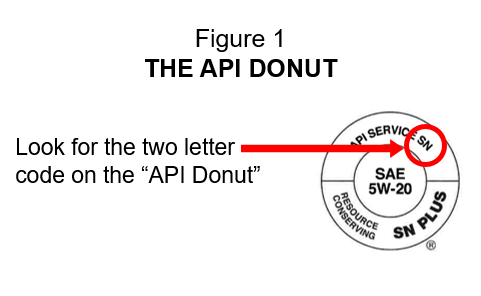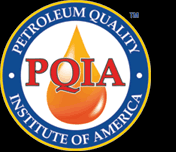|
SAE Viscosity Grade
The labels include important
information to
determine if an engine oil is
appropriate for use in your
vehicle. The first piece of
information speaks to viscosity
grade. The
Society of
Automotive Engineers
(SAE) defines a numerical system
for grading motor oils according
to viscosity. The suffixes (0,
5, 10, 15 and 25) followed by
the letter W designate the
engine oil's "winter" grade.
Look to your owner's manual. It
specifies the viscosity grade
required for your car's engine.
Today, the most common grades
are 5W-30.
API Service
Categories
Whereas the
labeling on the bottle of engine
oil may suggest the product is a
5W-30, note, if there is no "W"
between the 5 and the 30 it may
not be a 5W-30. As an example, a
5-30 is not the same as an
SAE 5W-30.
The
next "code" to look for is the
API Service Classification.
Although it might appear
complicated to understand at the
start, it is really a simple
system to get your arms around.
Think of it this way, when cars
were first built, the oil they
required needed an API SA
Service Classification. From
there, it moved to SB, SC, SD,
and so on (skipping only SI and
SK).
So if you buy
an engine oil meeting only API
SA, it's an engine oil
formulated for use in vehicles
built in the 1920s. And SA is
not hard to find mixed in with
SN on the shelves at c-stores
and others. Furthermore, it's also not hard
to find SF, SJ and other API
Service Categories on the
shelves. Also, don't let price
guide you. Engine oils with a
Service Classification prior to
SN (including SA) are often
priced close to that of API SN.
The
service rating of passenger car
and commercial automotive motor
oils is classified by the
American Petroleum Institute
(API). The program certifies
that an oil meets certain
Original Equipment Manufacturer
(OEM)
quality and performance
standards. The service rating is
shown in the API "Service Symbol
Donut" on the product label.
 The labels include two important
pieces of information to
determine if an engine oil is
appropriate for use in your
vehicle. The first piece of
information speaks to viscosity
grade. The
Society of
Automotive Engineers
(SAE) defines a numerical system
for grading motor oils according
to viscosity. The suffixes (0,
5, 10, 15 and 25) followed by
the letter W designate the
engine oil's "winter" grade. The labels include two important
pieces of information to
determine if an engine oil is
appropriate for use in your
vehicle. The first piece of
information speaks to viscosity
grade. The
Society of
Automotive Engineers
(SAE) defines a numerical system
for grading motor oils according
to viscosity. The suffixes (0,
5, 10, 15 and 25) followed by
the letter W designate the
engine oil's "winter" grade.
Look
to your owner's manual. It
specifies the viscosity grade
required for your car's engine.
Today, the most common grades
are 5W-30 and 10W-30.
OEM Specific Performance Specifications
Although the majority of vehicles currently on the road in the US specific the use of motor oils meeting a specific API Service
Category, some vehicle manufacturers require use of lubricants that meet the original equipment manufacturer's (OEM) specifications. General Motor’s dexos is one example. Click for more about the
dexos specification. Always check the labels on the motor oils purchased to assure they include any OEM specifications required in your vehicle.
Read the labels on
the oils you buy, ask questions
when you have your oil changed
and read your car owner's
manual.
Always consult your
vehicle owner's manual to
determine what motor oil you
should use, and READ THE LABELS
ON THE OIL YOU BUY.
American Petroleum
Institute
Gasoline
Engine Oil Service
Classifications |
|
Category |
Status |
Service |
|
SN
PLUS |
Current |
On November 9, 2017, the API Lubricants Standards Group approved the adoption of SN PLUS, a new classification that may be used in conjunction with API SN and API SN with Resource Conserving. API began licensing oils against the SN PLUS classification on May 1, 2018.
Click for more details. |
|
SN |
Current |
Introduced in October
2010 for 2011 and older
vehicles, designed to
provide improved high
temperature deposit
protection for pistons,
more stringent sludge
control, and seal
compatibility. API SN
with Resource
Conserving matches ILSAC
GF-5 by combining API SN
performance with
improved fuel economy,
turbocharger protection,
emission control system
compatibility, and
protection of engines
operating on
ethanol-containing
fuels up to E85. |
|
SM |
Current |
For 2010 and older
automotive engines. |
|
SL |
Current |
For 2004 and older
automotive engines. |
|
SJ |
Current |
For 2001 and older
automotive engines. |
|
SH |
Obsolete |
CAUTION
- Not suitable for use in most gasoline-powered automotive engines built after 1996. May not provide adequate protection against build-up of engine sludge, oxidation, or wear. |
|
SG |
Obsolete |
CAUTION
- Not suitable for use in most gasoline-powered automotive engines built after 1993. May not provide adequate protection against build-up of engine sludge, oxidation, or wear. |
|
SF |
Obsolete |
CAUTION
- Not suitable for use in most gasoline-powered automotive engines built after 1988. May not provide adequate protection against build-up of engine sludge. |
|
SE |
Obsolete |
CAUTION
- Not suitable for use in gasoline-powered automobile engines built after 1979. |
|
SD |
Obsolete |
CAUTION - Not suitable
for use in
gasoline-powered
automobile engines built
after 1971. Use in more
modern engines may cause
unsatisfactory
performance or equipment
harm. |
|
SC |
Obsolete |
CAUTION
- Not suitable
for use in
gasoline-powered
automobile engines built
after 1967. Use in more
modern engines may cause
unsatisfactory
performance or equipment
harm. |
|
SB |
Obsolete |
CAUTION - Not suitable
for use in
gasoline-powered
automobile engines built
after 1951. Use in more
modern engines may cause
unsatisfactory
performance or equipment
harm. |
|
SA |
Obsolete |
CAUTION
- Not suitable
for use in
gasoline-powered
automobile engines built
after 1930. Use in more
modern engines may cause
unsatisfactory
performance or equipment
harm. |
|




